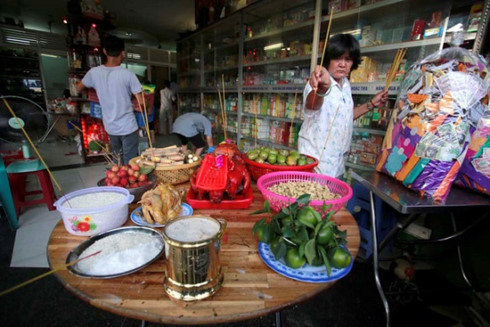 |
|
Vietnamese people often prepare some traditional dishes to pray for wandering souls. |
Ram (full-moon day) Thang Bay in Vietnamese, also known as the Hungry Ghost Festival or Ullambana Festival (Vu Lan), is a traditional Buddhist festival taking place on the 14th to 15th of the seventh month in lunar calendar.
It is considered the second most significant event of the year in Vietnam, after Tet holiday, and is an occasion to give thanks and praise to parents and ancestors as well as to embrace the “wandering souls”, in other words, the “forsaken spirits”.
Regarding the occasion in Buddhism, many followers in southern Vietnam took the practice of pinning red or white rose onto their shirts some 40 years ago to express their sincerity and respect to their parents. So far, it has become a customary practice in Ullambana Festival.
Accordingly, those whose parents passed away wear a white rose to show their grief and nostalgia to the deceased persons while those whose parents are alive wear red rose to remind themselves of offspring’s responsibilities of respecting and making their parents happy.
Besides, the Full Moon Day of the Lunar Seventh Month, which takes place on 15th August this year, is considered a taboo time according to the long-lasting traditional belief of the Vietnamese people that the gates of hell open from the 1st to 14th so that hungry spirits are free for a short time before returning to the fiery depths on the 15th.
Therefore, Buddhist followers and Vietnamese families often offer vegetarian meal including congee, salt, rice, among others and burn votive personal belongings and money to feed the destitute spirits or to help wandering souls find their way back home.
This kind of worship aims to avoid bad luck and bring peace to all family members.
According to Vietnamese belief, there are do’s and don’ts that people should notice when it comes to the 7th full-moon day of the year to avoid bad luck.
Don’ts
1. Hang wind chimes ahead the bed, which is believed to draw the attention of ghosts. They may annoy you when sleeping.
2. Go out at night.
3. Shave your legs or pluck your leg hair out because it is believed that the more leg hairs you have, the less chance ghost can follow you.
4. Burn votive paper and money without attentiveness.
5. Hang up wet clothes at night which may attract the spirits.
6. Call people’s names at night which may bring bad luck.
7. Hide, lie or sit near the banyan trees, where the negative spirits is embodied.
8. Pick up money on the streets because it may be money to offered for the wandering souls.
Dos
1. Worship at home or pagoda.
2. Avoid slaughtering.
3. Eat vegetarian meals.
4. Do charity work and help other people.
5. Stay away from disputes.
Hanoitimes



